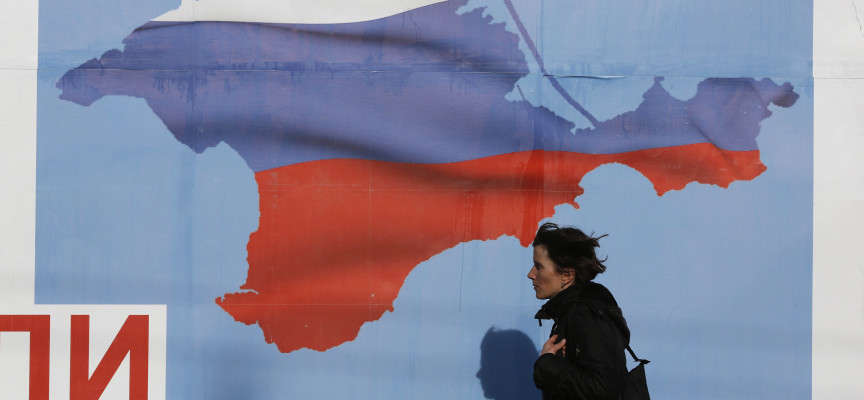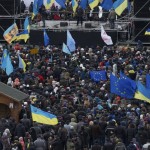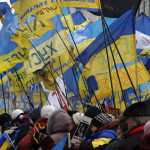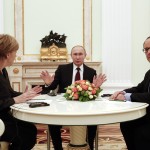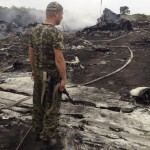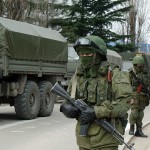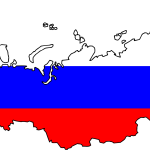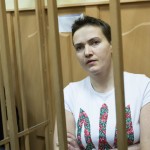With the annexation of Crimea and its risky separatism poker in Eastern Ukraine, Russian President Vladimir Putin has brought back a question into the political game, which seemed almost forgotten: the “national interest” of states. This question was an integral part of the logic of the 19th and 20th century, the guiding star of the foreign policy of most European powers.
Although the question of the national interest is entirely legitimate and could also be answered rationally, the peoples of Europe were led into cruel wars and chaos because of it. One reason for this was that the notion of national interest was often simplified and considered a synonym for the conquest of a territory or the strategic dominance over neighboring peoples. The last state that collapsed because of this concept was Serbia in the last decade of the 20th century.
The rush for military dominance and territorial expansion was then replaced by a peaceful competition for economic benefits and social standards. Within the EU, some smaller countries are being more successful and prosperous than larger ones. Military strength and territorial expansion are obviously no longer the key to national interests.
This was made possible both by NATO military umbrella and the recognition of certain basic rules. A consensus on fundamental values such as freedom, rule of law, solidarity, justice and ethnic pluralism has turned Europe into a common space where such principles are accepted, despite different cultures, languages and traditions. These rules also include that the boundaries between States may be changed peacefully and democratically only following certain procedures.
Since Russia has broken these rules, the foundations of the European order are suddenly in question. Putin has succeeded in reinterpreting the free decision of the Baltic States, Poland and other former Eastern bloc countries to join NATO as if the Western alliance was all about territorial expansion. Many are now following along the lines of this debate, thinking that Europe would be equally selfish to pursue its “interests” as Russia is doing. They don’t seem to understand that Europe follows a completely different model – based on freedom and peace.
In Germany, the public debate is currently dominated by a dispute between pro-Moscow “Russland-Versteher” on one side and those warning against Putin’s neo-imperialism on the other. Surprisingly enough, there are only few voices talking about the threat to the fundamental rules that forged a stable peace order in Europe after World War II. Even the Church is saying very little in this regard.
Back in the 1980s in Germany, Protestant theologians first and the Catholic Church afterwards were in the front line when it came to call for a Europe without nuclear weapons and a world without war. The German “peace movement” of the last quarter of the 20th century would not have been possible without Christians. Today, the church is incredibly standing on one side when it comes to the foundations of peace in Europe.
The common plea of the Evangelical Church in Germany and the German Catholic Bishops’ Conference for the European elections in 2014 has only briefly mentioned Ukraine and the threat to the European peace order. That’s better than nothing, but it is still not enough. A broad debate among Christians on the subject of war and peace, in which the Orthodox churches must also participate, would be definitely good for Europe.
Mit der Annektierung der Halbinsel Krim und seinem riskanten Separatismus-Poker in der Ost-Ukraine hat der russische Präsident Wladimir Putin eine Frage wieder ins politische Spiel zurückgebracht, die fast schon vergessen schien. Es ist die Frage nach dem “nationalen Interesse” eines jeden Staates. Diese Frage war in der Logik des 19. und auch des 20. Jahrhunderts der Leitstern des außenpolitischen Handelns der meisten europäischen Mächte.
Obwohl die Frage nach dem nationalen Interesse völlig legitim ist und meist auch rational beantwortet werden kann, führte sie die Völker Europas immer wieder in grausame Kriege und ins Chaos. Ein Grund dafür war, dass man nationales Interesse häufig vereinfacht definierte und mit dem Gewinn von Territorium oder der strategischen Dominanz über benachbarte Völker gleichsetzte. Der letzte Staat, der krachend mit diesem Konzept gescheitert ist, war Serbien im letzten Jahrzehnt des 20. Jahrhunderts.
An die Stelle des Wettlaufs um militärische Dominanz und territoriale Expansion ist ein friedlicher Wettbewerb um wirtschaftliche Vorteile und soziale Standards getreten. In der EU sind einige kleinere Staaten erfolgreicher und wohlhabender als manche größere. Militärische Stärke und territoriale Ausdehnung sind offensichtlich nicht mehr der Schlüssel zur Durchsetzung nationaler Interessen.
Ermöglicht wurde dies zum einen durch den militärischen Schutzschild der NATO, und dann durch die Anerkennung bestimmter Grundregeln. Ein Konsens über fundamentale Werte wie Freiheit, Rechtsstaatlichkeit, Solidarität, Gerechtigkeit und ethnischen Pluralismus hat Europa trotz unterschiedlicher Kulturen, Sprachen und Traditionen zu einem großen Raum gemacht, in dem solche Grundregeln akzeptiert werden. Zu diesen Regeln gehört auch, dass die Grenzen zwischen Staaten nur nach ganz bestimmten Verfahren friedlich und demokratisch geändert werden dürfen.
Seit Russland diese Regeln gebrochen hat, stehen auch die Grundlagen der europäischen Ordnung plötzlich wieder in Frage. Putin ist es gelungen, die freie Entscheidung der baltischen Staaten, der Polen und anderer ehemals von Moskau beherrschten Nationen für den Beitritt zur Nato so umzudeuten, als gehe es auch dem westlichen Bündnis lediglich um eine territoriale Expansion. Viele folgen nun dieser Polemik und meinen, Europa würde ebenso egoistisch seine „Interessen” verfolgen wie Russland das tut. Dass Europa ein ganz anderes Modell – auf der Grundlage von Freiheit und Frieden – verfolgt, begreifen sie nicht.
In Deutschland wird die öffentliche Debatte derzeit beherrscht von einem Disput, in dem moskaufreundliche „Russland-Versteher” auf der einen Seite und die Warner vor Putins Neo-Imperialismus auf der anderen Seite stehen. Erstaunlicherweise gibt es in dieser Debatte nur wenige Stimmen, die über die Gefährdung der fundamentalen Regeln sprechen, die Europas Friedensordnung seit dem Zweite Weltkrieg stabilisiert haben. Auch aus den Reihen der Kirchen ist dazu kaum etwas zu hören.
Noch in den 1980er Jahren waren in Deutschland zunächst protestantische Theologen und später auch die katholische Kirche in vorderster Linie, als es darum ging, ein Europa ohne Atomwaffen und eine Welt ohne Krieg zu fordern. Die deutsche „Friedensbewegung” vor einem Vierteljahrhundert wäre ohne Christen nicht denkbar gewesen. Heute halten sich die Kirchen erstaunlich zurück, wenn es um die Grundlagen des Friedens in Europa geht.
Der gemeinsame Aufruf der Evangelischen Kirche in Deutschland und der katholischen Deutschen Bischofskonferenz zur Europa-Wahl 2014 erwähnt die Ukraine und die Gefährdung der europäischen Friedensordnung mit einigen knappen Worten. Das ist besser als nichts, aber es ist zu wenig. Eine breite Debatte der Christen zum Thema Krieg und Frieden, an der sich auch die orthodoxen Kirchen beteiligen müssten, würde Europa gut tun.
Guerra e pace in Europa
Con l’annessione della penisola di Crimea e il suo rischioso poker del separatismo in Ucraina orientale, il presidente russo Vladimir Putin ha riportato nel gioco politico una domanda che sembrava quasi dimenticata. È la domanda dell’“interesse nazionale” di ogni Stato. Questa domanda era, nella logica del XIX e del XX secolo, la stella polare della politica estera della maggior parte delle potenze europee.
Anche se la questione dell’interesse nazionale è del tutto legittima e può trovare risposte razionali, essa ha ripetutamente portato i popoli d’Europa a guerre crudeli e al caos. Un motivo sta nel fatto che si è spesso definito l’interesse nazionale in modo semplificato, identificandolo con l’acquisizione di territori o di dominio strategico sui popoli confinanti. L’ultimo stato fragorosamente fallito su questo concetto è stata la Serbia nell’ultimo decennio del XX secolo.
Al posto della gara per il dominio militare e l’espansione territoriale è emersa una competizione pacifica su vantaggi economici e standard sociali. Nell’Unione europea, alcuni paesi più piccoli hanno più successo e sono più prosperi di alcuni tra quelli più grandi. Forza militare ed espansione territoriale non sono ovviamente più la chiave degli interessi nazionali.
Ciò è stato reso possibile per un verso attraverso lo scudo militare della Nato, e per altro attraverso il riconoscimento di alcune regole di base. Ora l’Europa ha allargato lo spazio in cui il consenso sui valori fondamentali quali la libertà, lo stato di diritto, la solidarietà, la giustizia e il pluralismo etnico sono accettati come regole fondamentali, nonostante culture, lingue e tradizioni diverse. A queste regole appartiene anche il principio per cui i confini tra gli Stati membri possono essere modificati in modo pacifico e democratico attraverso procedure precise.
Dal momento che la Russia ha infranto queste regole, anche le fondamenta dell’ordinamento europeo sono improvvisamente messe in questione. Putin è riuscito a reinterpretare la libera decisione degli Stati baltici, della Polonia e degli altri paesi in passato sotto il dominio di Mosca, di aderire alla Nato come se anche l’alleanza occidentale fosse solo un’espansione territoriale. Molti ora seguono questa polemica e pensano che l’Europa sarebbe altrettanto egoista, perseguendo i propri “interessi” come fa la Russia. E non capiscono che l’Europa funziona in modo completamente diverso, sulla base della libertà e della pace.
In Germania, il dibattito pubblico è attualmente dominato da una controversia in cui da un lato ci sono i filo-Mosca “comprensivi verso la Russia” e dall’altra parte c’è chi mette in guardia di fronte al neo-imperialismo di Putin. È sorprendente che in questo dibattito ci siano solo poche voci che parlano della minaccia alle regole fondamentali che hanno dato stabilità all’ordine europeo dopo la seconda guerra mondiale. Dalle file delle Chiese non si è sentito quasi nulla a questo proposito.
In Germania, ancora negli anni ‘80, i teologi protestanti e successivamente anche la Chiesa cattolica erano in prima linea quando si trattava di chiedere un’Europa senza armi nucleari e un mondo senza guerra. Il “movimento pacifista” tedesco un quarto di secolo fa non sarebbe stato possibile senza i cristiani. Oggi, le Chiese si tengono incredibilmente in disparte quando si tratta dei fondamenti della pace in Europa.
L’appello congiunto della Chiesa evangelica in Germania e della Conferenza episcopale tedesca per le elezioni europee del 2014 menziona l’Ucraina e la minaccia alla pace europea con poche parole. Che sono meglio di niente, ma sono troppo poco. Un ampio dibattito dei cristiani sul tema della guerra e della pace, a cui anche le chiese ortodosse dovrebbero partecipare, farebbe bene all’Europa.
Ludwig Ring-Eifel
Chefredakteur, Kna (Deutschland)
Latest posts by Ludwig Ring-Eifel (see all)
- What will be Pope Francis’ message? - 14 ottobre 2014
- Stop the slaughterers in Iraq - 16 agosto 2014
- The Strasbourg Burqa judgment - 10 luglio 2014

